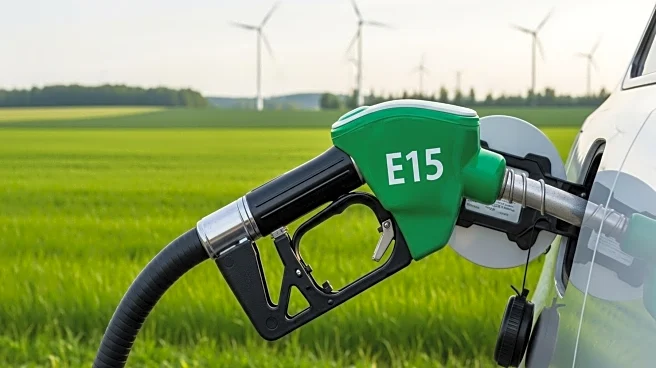What's Happening?
California has approved the sale of E15, a gasoline blend containing 15% ethanol, marking a significant shift in the state's energy policy. The passage of Assembly Bill 30 by the California State Senate and Assembly awaits Governor Gavin Newsom's signature to become law. This move is expected to increase demand for ethanol, benefiting biofuel producers and corn farmers, particularly in the Midwest. The Renewable Fuels Association and Growth Energy have advocated for this change, which aligns with California's environmental goals. However, concerns about sustainability and environmental impacts, such as agricultural pollution, remain.
Why It's Important?
The approval of E15 in California, the last U.S. state to permit its sale, opens a substantial market for biofuel producers, potentially increasing ethanol demand by up to 700 million gallons annually. This development supports the renewable energy sector and offers economic opportunities for corn farmers, stabilizing prices and enhancing profitability. However, the environmental implications, including fertilizer runoff and water contamination, pose challenges that need addressing. The move reflects California's commitment to reducing emissions and promoting sustainable energy practices, impacting national energy policies and agricultural dynamics.
What's Next?
Governor Gavin Newsom's signature is awaited to finalize the approval of E15. The California Air Resources Board will expedite rulemaking to ensure regulatory clarity. Biofuel producers and corn farmers must prepare for increased scrutiny on environmental practices, as upcoming climate disclosure laws will require reporting of greenhouse gas emissions and climate-related financial risks. Collaborative efforts between industry stakeholders and environmental groups are essential to mitigate risks and maximize the benefits of E15 adoption.
Beyond the Headlines
The approval of E15 raises ethical and environmental questions about the sustainability of increased corn cultivation and its impact on water quality. The reliance on imported ethanol shifts environmental costs to regions already facing agricultural pollution challenges. Addressing these concerns is crucial for the long-term success of E15 and its contribution to California's environmental goals.











